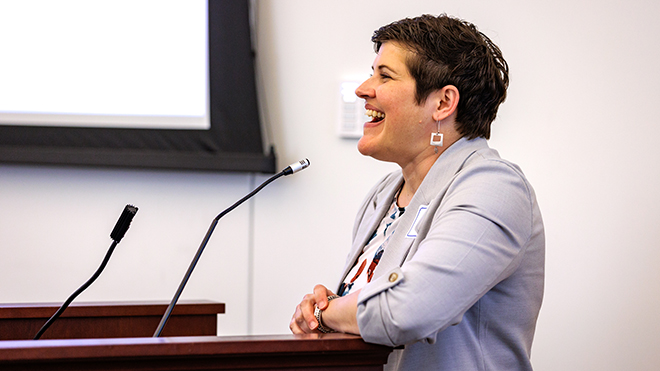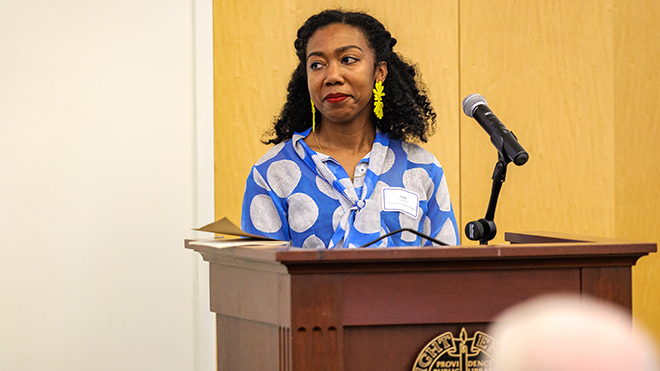Co-Lab Convenes Public Humanities Practitioners to Share Research, Stories About Race and Place
At this inaugural conference, researchers and practitioners from more than 40 organizations and institutions discussed how to drive meaningful change through the public humanities and arts.

PROVIDENCE, R.I. – Engaging with the impact of mass incarceration. Documenting Latino and Asian American Pacific Islander (AAPI) history in Rhode Island. Interpreting slavery at historic sites. These were a few of the many topics that public humanities practitioners discussed at the annual conference hosted by Roger Williams University’s Public Humanities and Arts Collaborative (The Co-Lab) in June.
Funded by the National Endowment for the Humanities, the regional public humanities gathering – (Re)Telling: Crafting New Stories of Race and Place in Southern New England, held at the Providence Public Library in Providence, R.I. – brought together more than 40 organizations, groups, and institutions engaged in the public humanities work of researching, crafting, and sharing stories about race and place in our region.
“Roger Williams University is proud to be a convener and leader in regional conversations on public humanities and race,” said Elaine Stiles, Co-Lab Faculty Director and Associate Professor of Preservation Practices at RWU. “Thanks to our supporters and speakers, the gathering was a meaningful forum for regional conversations on the challenges and the joys of doing this work. We had excellent engagement from major institutions across southern New England who came together to discuss these important topics.”

Over the course of the day, participants heard from efforts to foster and amplify new and known narratives, engage in public dialogs that promote collective understanding, and use stories to further justice-oriented action in the present, Stiles said. The case studies encompassed a range of time periods, identities, and methodologies such as:
- engaging with the impact of mass incarceration via the papers of Mumia abu Jamal
- reshaping or making new, more inclusive commemorative or reparative landscapes
- using art and “artivisim” to convey messages to the public
- co-creating public humanities projects with Black and indigenous communities
- oral history and community history and storytelling
- interpreting slavery at historic sites
- efforts to document Latino and AAPI history in R.I.
The keynote program featured Elon Cook Lee, Director of Interpretation and Education at the National Trust for Historic Preservation, in conversation with Kristin Gallas of Muse Consulting. Lee shared her work as a public historian, educator, curator, and interpreter and the initiatives she is leading at the National Trust that focus on interpreting historic spaces through frameworks of repair, and equitable collaboration with descendants of slavery, exclusion, and colonization.

“The goals of (Re)Telling were to explore increased connections between organizations engaged in this work in the region and to consider ways to stimulate new research and programming collaborations through a public humanities consortium,” Stiles said.
Topics raised for further work in community included interpreting slavery; engaging with indigenous communities and history; working with lost, erased, or invisible places; hosting an annual gathering; creating directories of regional projects and subject-based research and working groups. The Co-Lab, with support from the NEH, will be hosting four follow-up gatherings and trainings in the coming academic year.
